Table of Contents
Chapter 10
Successful World's Alliance POW Diplomacy: Phildius and WPA Relief Work in Bulgaria
1
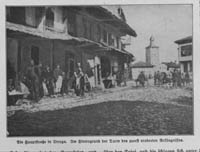 Still recovering from the Second Balkan War, Bulgaria declared its neutrality in World War I on 29 September
1914. The kingdom's position was crucial for the Central Powers after Russia declared war on the Ottoman
Empire in November 1914. Bulgaria was the key link in the Berlin-Baghdad Railway, by which Germany supplied
and maintained communications with Turkey. Both the Allies and Central Powers began to court Sofia in attempts
to entice the Bulgarians into their respective camps. Austria-Hungary's inability to eliminate Serbia by December
1914 increased Bulgaria's value to the Central Powers. The Allies' failure to force the Dardanelles in February
1915 did not enhance their position with the Bulgarians. Bulgaria was primarily interested in Serbian territory,
especially Macedonia, which it had lost in the Treaty of Bucharest of 1913. In September 1915, the Bulgarians
threw in their lot with Germany and Austria-Hungary by concluding an alliance. On October 6, the great
Austro-German offensive began against Serbia and Bulgaria declared war on Belgrade eight days later. Bulgarian
troops spilled over Serbia's eastern border, and an Anglo-French landing at Salonika in Greece failed to blunt
the Bulgarian advance. By December 1915, the Serbian Army had collapsed and was in full flight. The Bulgarians
established a defensive line to contain the Allied forces in northern Greece.
Still recovering from the Second Balkan War, Bulgaria declared its neutrality in World War I on 29 September
1914. The kingdom's position was crucial for the Central Powers after Russia declared war on the Ottoman
Empire in November 1914. Bulgaria was the key link in the Berlin-Baghdad Railway, by which Germany supplied
and maintained communications with Turkey. Both the Allies and Central Powers began to court Sofia in attempts
to entice the Bulgarians into their respective camps. Austria-Hungary's inability to eliminate Serbia by December
1914 increased Bulgaria's value to the Central Powers. The Allies' failure to force the Dardanelles in February
1915 did not enhance their position with the Bulgarians. Bulgaria was primarily interested in Serbian territory,
especially Macedonia, which it had lost in the Treaty of Bucharest of 1913. In September 1915, the Bulgarians
threw in their lot with Germany and Austria-Hungary by concluding an alliance. On October 6, the great
Austro-German offensive began against Serbia and Bulgaria declared war on Belgrade eight days later. Bulgarian
troops spilled over Serbia's eastern border, and an Anglo-French landing at Salonika in Greece failed to blunt
the Bulgarian advance. By December 1915, the Serbian Army had collapsed and was in full flight. The Bulgarians
established a defensive line to contain the Allied forces in northern Greece.
2
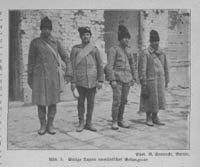 The Bulgarian Army went on the offensive again late in 1916. In light of the apparent success of the Russians'
Brusilov Offensive against the Dual Monarchy, Romania declared war on Austria-Hungary on 27 August 1916.
Bulgaria declared war on Romania four days later, as the Romanians made minimal gains in Transylvania. In
late September, Austro-German forces counter-attacked, and the Bulgarians advanced into Dobrudja from the
south in October, regaining territory lost by the kingdom in the Second Balkan War. By December, Bucharest
had fallen to the Central Powers, leaving only Moldavia under Romanian control.1
The Bulgarian Army went on the offensive again late in 1916. In light of the apparent success of the Russians'
Brusilov Offensive against the Dual Monarchy, Romania declared war on Austria-Hungary on 27 August 1916.
Bulgaria declared war on Romania four days later, as the Romanians made minimal gains in Transylvania. In
late September, Austro-German forces counter-attacked, and the Bulgarians advanced into Dobrudja from the
south in October, regaining territory lost by the kingdom in the Second Balkan War. By December, Bucharest
had fallen to the Central Powers, leaving only Moldavia under Romanian control.1
3
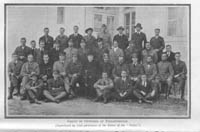 During these offensives, the Bulgarians captured a large number of Serbian and Romanian prisoners of war, as
well as British, French, Italian, Russian, and Greek troops. The conditions in the Bulgarian prison camps were
abysmal. A British pilot shot down over Turkish lines was transferred to the Bulgarian prison camp at Philippopolis.
The officers lived in a former cholera hospital with a concrete floor and a sheet-iron roof, which leaked until
it was blown off in a sandstorm and never replaced. The walls were coated with mud and chopped straw, ideal
conditions for vermin. The facility lacked furniture, crockery, and washing accommodations; individual POWs
constructed their own furniture and partitions by purchasing construction material in town at exorbitant prices.
Daily rations were limited to three hundred grams of black bread and pepper-pods, egg-fruit (an egg-shaped orange-yellow
sweet fruit), rice-mill siftings, or cabbage, an inadequate diet upon which to survive. POWs became dependent on
food parcels from home, and officers formed messes through which they pooled food and spare clothing. Some food
could be purchased in town at prohibitive prices including sugar, butter, flour, chickens, potatoes, eggs, apples,
plums, tea, coffee, cocoa, and scarce soap. Fuel-charcoal and wood-was among the largest expenses, and lighting
was very difficult because oil was unavailable. A used suit of clothes in poor condition cost £ 50. The U.S.
Charge d'Affaires at Sofia, Dominic I. Murphy, conducted official visits to the prison camp. He provided money
to needy POWs and did his best to make improvements in the facility, especially in regard to administrative
restrictions.2
During these offensives, the Bulgarians captured a large number of Serbian and Romanian prisoners of war, as
well as British, French, Italian, Russian, and Greek troops. The conditions in the Bulgarian prison camps were
abysmal. A British pilot shot down over Turkish lines was transferred to the Bulgarian prison camp at Philippopolis.
The officers lived in a former cholera hospital with a concrete floor and a sheet-iron roof, which leaked until
it was blown off in a sandstorm and never replaced. The walls were coated with mud and chopped straw, ideal
conditions for vermin. The facility lacked furniture, crockery, and washing accommodations; individual POWs
constructed their own furniture and partitions by purchasing construction material in town at exorbitant prices.
Daily rations were limited to three hundred grams of black bread and pepper-pods, egg-fruit (an egg-shaped orange-yellow
sweet fruit), rice-mill siftings, or cabbage, an inadequate diet upon which to survive. POWs became dependent on
food parcels from home, and officers formed messes through which they pooled food and spare clothing. Some food
could be purchased in town at prohibitive prices including sugar, butter, flour, chickens, potatoes, eggs, apples,
plums, tea, coffee, cocoa, and scarce soap. Fuel-charcoal and wood-was among the largest expenses, and lighting
was very difficult because oil was unavailable. A used suit of clothes in poor condition cost £ 50. The U.S.
Charge d'Affaires at Sofia, Dominic I. Murphy, conducted official visits to the prison camp. He provided money
to needy POWs and did his best to make improvements in the facility, especially in regard to administrative
restrictions.2
4
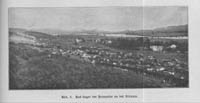 Conditions were even worse for the rank and file. Bulgarian forces captured British troops near Dorian and
confiscated their boots, puttees, and tunics. The POWs then marched to Sofia-150 miles-barefoot, in their shirts
and summer shorts. The only food they had was found by foraging onions, roots, and corn from the fields by the
roadside. On the march for sixteen days, they received a small loaf of bread on only one occasion. At the prison
camp in Philippopolis, the troops were herded into filthy barracks in lots of one thousand. Many men chose to sleep outside
rather than face the vermin at night. Their rations were totally inadequate and unpalatable. Like the officers, the
British enlisted prisoners relied on food parcels to survive.3
Conditions were even worse for the rank and file. Bulgarian forces captured British troops near Dorian and
confiscated their boots, puttees, and tunics. The POWs then marched to Sofia-150 miles-barefoot, in their shirts
and summer shorts. The only food they had was found by foraging onions, roots, and corn from the fields by the
roadside. On the march for sixteen days, they received a small loaf of bread on only one occasion. At the prison
camp in Philippopolis, the troops were herded into filthy barracks in lots of one thousand. Many men chose to sleep outside
rather than face the vermin at night. Their rations were totally inadequate and unpalatable. Like the officers, the
British enlisted prisoners relied on food parcels to survive.3
5 Serbian and Romanian prisoners faced an even bleaker situation. The Serb POWs at Philippopolis were "a broken, spiritless wreck of humanity, clothed in filthy rags, and it is a marvel that any of them survived the winter [of 1917-1918]," wrote one observer. The only food the Serbs received each day was 300 grams of black bread and a small amount of soup, composed mostly of water and little else. They did not receive food parcels from home, and they did not have the resources to form regimental messes. Serbian women who became refugees in Bulgaria turned to prostitution to feed their children, and as a result were beaten for moral offenses. The death rate from starvation and cruelty during the winter of 1917-1918 was appalling at Philippopolis: of the one hundred thousand Serbs interned in Bulgaria during the war, only fifty-three thousand were alive in November 1918. At the prison camp at Haskovo, three thousand of the eight thousand Serbian POWs died during the war.
6
Conditions in the prison camps containing Romanian soldiers were no better. At the Romanian prison at Rustchuk, a typhus epidemic broke out, but the Bulgarians did not provide a doctor. A Romanian physician attempted to provide comfort, until he became infected and died. To control the epidemic, the Bulgarians isolated the sick and allowed the disease to run its course. Of the 450 inmates sealed off in isolation, only 150 recovered.4
7
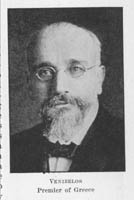 In September 1918, after breaching the Bulgarian defenses and forcing an armistice, the Allies found horrendous
conditions, which became known as the "Bulgarian Atrocities." The Greek Premier, Eleutherios Venizelos, requested
that the Red Cross investigate the situation in Eastern Macedonia. The Bulgarians had attempted to eliminate Greek
culture in the region by burning villages, deporting populations, and inflicting torture to incorporate Eastern
Macedonia into the kingdom. Before September 1917, when it was occupied by Bulgarian forces, the city of Seres
had a total population of 23,693, which included 14,938 Greeks, 7,925 Turks, and 730 Jews. When the Allies reentered
the city one year later, the population had been reduced to only 5,793 people. Half of the population consisted of
new Bulgarian arrivals, transported from the interior of Bulgaria, and of the remaining 2,293 Greeks, half were
children under ten years old. The Bulgarians had also committed atrocities against the Greeks in Drama. The Anglican
Archbishop of London visited Macedonia shortly after the Allied advance. He reported to Greek authorities in Athens
about the destruction of Greek property and inhuman acts. Greek officers who had been captured by the Bulgarians
described how they were incarcerated in cages without food and clothing, and told that the guards had stolen artificial
gold teeth from British officers. From the Western perspective, the conditions in Bulgaria bordered on the
barbarous.5
In September 1918, after breaching the Bulgarian defenses and forcing an armistice, the Allies found horrendous
conditions, which became known as the "Bulgarian Atrocities." The Greek Premier, Eleutherios Venizelos, requested
that the Red Cross investigate the situation in Eastern Macedonia. The Bulgarians had attempted to eliminate Greek
culture in the region by burning villages, deporting populations, and inflicting torture to incorporate Eastern
Macedonia into the kingdom. Before September 1917, when it was occupied by Bulgarian forces, the city of Seres
had a total population of 23,693, which included 14,938 Greeks, 7,925 Turks, and 730 Jews. When the Allies reentered
the city one year later, the population had been reduced to only 5,793 people. Half of the population consisted of
new Bulgarian arrivals, transported from the interior of Bulgaria, and of the remaining 2,293 Greeks, half were
children under ten years old. The Bulgarians had also committed atrocities against the Greeks in Drama. The Anglican
Archbishop of London visited Macedonia shortly after the Allied advance. He reported to Greek authorities in Athens
about the destruction of Greek property and inhuman acts. Greek officers who had been captured by the Bulgarians
described how they were incarcerated in cages without food and clothing, and told that the guards had stolen artificial
gold teeth from British officers. From the Western perspective, the conditions in Bulgaria bordered on the
barbarous.5
Bulgaria and YMCA Prisoner-of-War Work
8
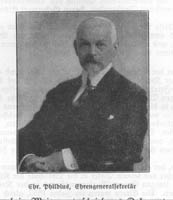 When Bulgaria entered the war in October 1915, the leadership of the Bulgarian National YMCA committee contacted
Christian Phildius and the World's Committee in Geneva requesting assistance. They wanted the YMCA to set up war
work operations for Bulgarian soldiers, similar to the work conducted for Austro-Hungarian troops. As mentioned
earlier, the Bulgarian YMCA was in serious straits. The Bulgarian Army conscripted all of the members of the
National Committee into military service, except for Reverend D. N. Furnajieff, President
of the committee, and the Vice President, Stefen Botcheff. Furnajieff proposed Association service for soldiers
at the most important centers, and pointed out that POW work could be undertaken for Serbian, British, and French
prisoners held in Bulgaria. In December 1915, the Bulgarian YMCA distributed Scriptures to POWs, although they
quickly exhausted their supply of Bibles in English, and it was extremely difficult to find copies in French or
Serbian. Furnajieff requested that the British Bible Society send Bulgarian Bibles and selections from the Gospels,
Psalms, and Proverbs for distribution to Bulgarian troops, along with as many English, Serbian, and French Scriptures
as possible. To further expand Association work in Bulgaria, Furnajieff requested that Phildius collect official
testimonials of the benefit of YMCA work in Germany, France, Austria-Hungary, and other countries to present to
Bulgarian government officials.6
When Bulgaria entered the war in October 1915, the leadership of the Bulgarian National YMCA committee contacted
Christian Phildius and the World's Committee in Geneva requesting assistance. They wanted the YMCA to set up war
work operations for Bulgarian soldiers, similar to the work conducted for Austro-Hungarian troops. As mentioned
earlier, the Bulgarian YMCA was in serious straits. The Bulgarian Army conscripted all of the members of the
National Committee into military service, except for Reverend D. N. Furnajieff, President
of the committee, and the Vice President, Stefen Botcheff. Furnajieff proposed Association service for soldiers
at the most important centers, and pointed out that POW work could be undertaken for Serbian, British, and French
prisoners held in Bulgaria. In December 1915, the Bulgarian YMCA distributed Scriptures to POWs, although they
quickly exhausted their supply of Bibles in English, and it was extremely difficult to find copies in French or
Serbian. Furnajieff requested that the British Bible Society send Bulgarian Bibles and selections from the Gospels,
Psalms, and Proverbs for distribution to Bulgarian troops, along with as many English, Serbian, and French Scriptures
as possible. To further expand Association work in Bulgaria, Furnajieff requested that Phildius collect official
testimonials of the benefit of YMCA work in Germany, France, Austria-Hungary, and other countries to present to
Bulgarian government officials.6
9
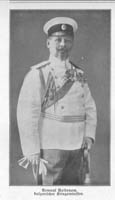 In response to these requests, the World's Alliance and the American YMCA decided in the spring of 1916 to send
aid to Bulgaria. Due to commitments in Austria-Hungary and Germany, Phildius was not able to travel to Bulgaria
until the fall of that year. The World's Alliance secretary traveled to Sofia and met with General Neidenoff,
the Bulgarian Minister of War, and the General Staff in December 1916. With the approval of the Bulgarian
government, Phildius inspected prison camps, with Furnajieff serving as his interpreter. Phildius visited eight
POW camps, including three near Sofia and others at Philippopolis, Stara-Zagora, Goino Pauicheievo, Sliven, and
Rakhovo. The Bulgarian government was impressed with Phildius' presentation, which included a report on the work
accomplished by Association secretaries in France working with Bulgarian POWs and internees. On 5 January 1917,
Phildius cabled that the Bulgarian government had granted permission for the YMCA to work for POWs in Bulgaria.
Cables that followed indicated that the government would let the Association undertake work at eight prison camps
for POWs, and at four military centers for Bulgarian soldiers. The Bulgarian government requested that the
Association construct YMCA huts at each of these locations. Phildius declared that the "the hearty response by
the Minister of War and the General Staff … opened wide the door of opportunity in Bulgaria."7
In response to these requests, the World's Alliance and the American YMCA decided in the spring of 1916 to send
aid to Bulgaria. Due to commitments in Austria-Hungary and Germany, Phildius was not able to travel to Bulgaria
until the fall of that year. The World's Alliance secretary traveled to Sofia and met with General Neidenoff,
the Bulgarian Minister of War, and the General Staff in December 1916. With the approval of the Bulgarian
government, Phildius inspected prison camps, with Furnajieff serving as his interpreter. Phildius visited eight
POW camps, including three near Sofia and others at Philippopolis, Stara-Zagora, Goino Pauicheievo, Sliven, and
Rakhovo. The Bulgarian government was impressed with Phildius' presentation, which included a report on the work
accomplished by Association secretaries in France working with Bulgarian POWs and internees. On 5 January 1917,
Phildius cabled that the Bulgarian government had granted permission for the YMCA to work for POWs in Bulgaria.
Cables that followed indicated that the government would let the Association undertake work at eight prison camps
for POWs, and at four military centers for Bulgarian soldiers. The Bulgarian government requested that the
Association construct YMCA huts at each of these locations. Phildius declared that the "the hearty response by
the Minister of War and the General Staff … opened wide the door of opportunity in Bulgaria."7
10
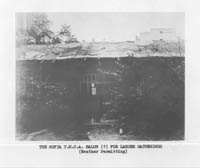 Phildius negotiated a general POW plan with the Bulgarian government after his inspection tour. In Sofia,
the YMCA planned to set up operations in three prison camps that housed a total of twenty thousand Serbian, Romanian,
Russian, English, French, and Italian POWs. At two of these camps, the Red Triangle agreed to build a hut to
serve prisoners, guards, and Bulgarian officers. At the third camp, the commandant provided several rooms to
be converted to YMCA use.
Phildius negotiated a general POW plan with the Bulgarian government after his inspection tour. In Sofia,
the YMCA planned to set up operations in three prison camps that housed a total of twenty thousand Serbian, Romanian,
Russian, English, French, and Italian POWs. At two of these camps, the Red Triangle agreed to build a hut to
serve prisoners, guards, and Bulgarian officers. At the third camp, the commandant provided several rooms to
be converted to YMCA use.
 At Philippopolis, the Red Triangle planned to erect two huts for the 5,200 prisoners (including forty-eight Serbian,
British, and French officers). The first hut would be set up like the two huts in the Sofia prisons. Camp
officials at Philippopolis pleaded that a second hut be constructed to serve as an infirmary. This hut would
accommodate fifty sick and convalescent prisoners.
At Philippopolis, the Red Triangle planned to erect two huts for the 5,200 prisoners (including forty-eight Serbian,
British, and French officers). The first hut would be set up like the two huts in the Sofia prisons. Camp
officials at Philippopolis pleaded that a second hut be constructed to serve as an infirmary. This hut would
accommodate fifty sick and convalescent prisoners.
11
There were eight hundred Serbian POWs at Stara-Zagora housed in a large warehouse, part of which the Bulgarians modified for YMCA operations. At Goino Pauicheievo, almost four thousand prisoners (including eighty English, French, and Serbian officers, plus eighty-one Serbian Orthodox priests-army chaplains) required Red Triangle attention. The Bulgarians suggested that the YMCA construct a hut at this prison, but Phildius requested that one of the large barracks be placed at the disposal of the secretaries and modified for YMCA operations. Approximately 1,800 Romanian, Russian, and Italian POWs, plus 575 interned civilians from nine nations, were confined at Rakhovo. The YMCA constructed a hut to serve POWs, guards, and Bulgarian officers at the facility. Finally, 19,900 men (including 104 Serbian, Russian, Romanian, English, and French officers, plus sixteen Serbian Orthodox priests) were incarcerated at Sliven. They also requested a YMCA hut.8
12
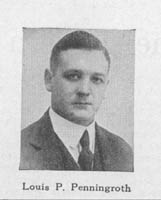 In response to Phildius' initial work, the International Committee in New York agreed to finance the work in Bulgaria
and dispatched Louis Penningroth to serve as the organization's senior secretary there. Penningroth had been working
with POWs in Austria-Hungary before transferring to Sofia. While the Americans funded war work operations, the World's
Alliance conducted the welfare services under its auspices.
In response to Phildius' initial work, the International Committee in New York agreed to finance the work in Bulgaria
and dispatched Louis Penningroth to serve as the organization's senior secretary there. Penningroth had been working
with POWs in Austria-Hungary before transferring to Sofia. While the Americans funded war work operations, the World's
Alliance conducted the welfare services under its auspices.
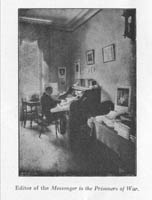 Ernst Sartorius, a member of the Swiss National YMCA Committee, also arrived in Sofia to supervise Association
operations. Sartorius set up a War Prisoners' Aid office in Sofia, which supervised POW work operations, and a
POW information office to handle inquiries regarding missing men. By September 1918, seven World's Alliance
secretaries were conducting YMCA POW work in Bulgaria under the authority of the Bulgarian Red Cross and the
American and Dutch embassies.9
Ernst Sartorius, a member of the Swiss National YMCA Committee, also arrived in Sofia to supervise Association
operations. Sartorius set up a War Prisoners' Aid office in Sofia, which supervised POW work operations, and a
POW information office to handle inquiries regarding missing men. By September 1918, seven World's Alliance
secretaries were conducting YMCA POW work in Bulgaria under the authority of the Bulgarian Red Cross and the
American and Dutch embassies.9
13
Because Bulgaria was primarily an agricultural nation rather than an industrial state, YMCA secretaries were confronted with a general lack of manufactured articles, especially clothing and blankets. The World's Alliance secretaries also reported on the general impoverished state of the nation, given that it was in the midst of its third war in five years. The Red Triangle workers found POW diets to be occasionally better than the fare received by Bulgarian soldiers, although the prisoners' rations were well below the accepted standards for soldiers or POWs in other countries. Bulgaria desperately needed foreign aid, and this was a prime opportunity for the Association, especially in terms of providing Christian service and the potential post-war benefits that might enable it to spread its influence in Bulgaria. Because of these terrible conditions, the International Committee increased its war work appropriation to Bulgaria to a total of $20,000, with 50 percent scheduled for POW work and the remainder for war work for soldiers.10
14
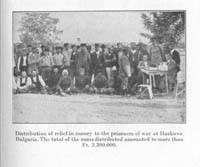 While the YMCA attempted to avoid relief work, because such service fell under the purview of other relief
agencies, the Red Triangle became involved in physical relief to a much greater degree in Bulgaria than in other
nations. The need for food and clothing had become acute for many war prisoners. Because of the poor dietary
standards of Serbian and Romanian POWs, YMCA secretaries gained permission from Bulgarian camp authorities to
purchase food. The Association then leased land near the prison camps for the POWs to put under cultivation
to augment their food supply. To address the clothing crisis, the YMCA distributed garments provided by the Italian,
Greek, and Serbian Legations. In addition, the Association purchased clothing for prisoners with its own funds.
Phildius enjoyed remarkable freedom to travel freely between Bulgaria and Switzerland, where he could purchase
supplies. In December 1917, Phildius presented a general plan for YMCA POW work in Bulgaria to the Minister of
War, which the authorities accepted. The Swiss secretary even assisted a Bulgarian general, who had gone to
Switzerland to purchase food and clothing, in completing his mission after he had not been able to secure his
orders.11
While the YMCA attempted to avoid relief work, because such service fell under the purview of other relief
agencies, the Red Triangle became involved in physical relief to a much greater degree in Bulgaria than in other
nations. The need for food and clothing had become acute for many war prisoners. Because of the poor dietary
standards of Serbian and Romanian POWs, YMCA secretaries gained permission from Bulgarian camp authorities to
purchase food. The Association then leased land near the prison camps for the POWs to put under cultivation
to augment their food supply. To address the clothing crisis, the YMCA distributed garments provided by the Italian,
Greek, and Serbian Legations. In addition, the Association purchased clothing for prisoners with its own funds.
Phildius enjoyed remarkable freedom to travel freely between Bulgaria and Switzerland, where he could purchase
supplies. In December 1917, Phildius presented a general plan for YMCA POW work in Bulgaria to the Minister of
War, which the authorities accepted. The Swiss secretary even assisted a Bulgarian general, who had gone to
Switzerland to purchase food and clothing, in completing his mission after he had not been able to secure his
orders.11
15
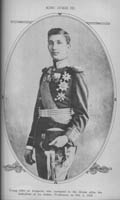 Although Phildius negotiated a general understanding with the Bulgarian government in January 1917, which resulted
in the dispatch of World's Alliance secretaries to the kingdom, the YMCA and royal government did not sign an
official agreement until December 1917. This WPA agreement was similar to those negotiated with other belligerent
governments and established the World's Alliance Bulgarian Branch of the YMCA. The Bulgarian WPA received the
patronage of Crown Prince Boris and the committee members represented some of the most influential people in the
kingdom.
Although Phildius negotiated a general understanding with the Bulgarian government in January 1917, which resulted
in the dispatch of World's Alliance secretaries to the kingdom, the YMCA and royal government did not sign an
official agreement until December 1917. This WPA agreement was similar to those negotiated with other belligerent
governments and established the World's Alliance Bulgarian Branch of the YMCA. The Bulgarian WPA received the
patronage of Crown Prince Boris and the committee members represented some of the most influential people in the
kingdom.
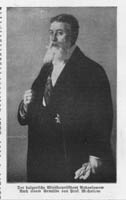 The National Committee included Ministry of War officials (Minister of War Lieutenant-General Neidenoff;
Lieutenant-General Bradistiloff; Major-General Loloff; and Major-General Mitoff), army headquarters staff members
(Lieutenant-General Jecoff, Generalissimo of the Bulgarian Army; Major-General Batsaroff, Chief Surgeon; and
Major-General Sagorski); the Prime Minister (Vasil Radoslavov, President of the Council and Foreign Minister);
members of the royal court (Lieutenant-General Markoff, the Aide de Camp to Tsar Ferdinand as well as M. Dobrovitch,
the Chief of Cabinet); church leaders (Monseigneur Josif, the Senior Chaplain, and Monsiegneur Vincent Peeff); the
President of the Bulgarian Red Cross Society (I.E. Guechoff); the national poet (I. Wasoff); university professors
(I. Georgoff and K. Stephanoff); and a member of the press (I. Peet-Platzkoff). The YMCA representatives on this
committee included Fournajieff, Botcheff, and Sartorius. The strong support of the Bulgarian government for POW
relief operations was reflected in the committee membership.12
The National Committee included Ministry of War officials (Minister of War Lieutenant-General Neidenoff;
Lieutenant-General Bradistiloff; Major-General Loloff; and Major-General Mitoff), army headquarters staff members
(Lieutenant-General Jecoff, Generalissimo of the Bulgarian Army; Major-General Batsaroff, Chief Surgeon; and
Major-General Sagorski); the Prime Minister (Vasil Radoslavov, President of the Council and Foreign Minister);
members of the royal court (Lieutenant-General Markoff, the Aide de Camp to Tsar Ferdinand as well as M. Dobrovitch,
the Chief of Cabinet); church leaders (Monseigneur Josif, the Senior Chaplain, and Monsiegneur Vincent Peeff); the
President of the Bulgarian Red Cross Society (I.E. Guechoff); the national poet (I. Wasoff); university professors
(I. Georgoff and K. Stephanoff); and a member of the press (I. Peet-Platzkoff). The YMCA representatives on this
committee included Fournajieff, Botcheff, and Sartorius. The strong support of the Bulgarian government for POW
relief operations was reflected in the committee membership.12
16
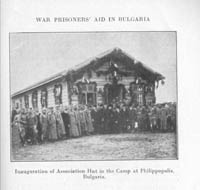 Within a year, the YMCA had constructed five huts in the largest prison camps, and in another five camps existing
barracks were modified into Association buildings. Jack Keller set up operations in Philippopolis by June 1917.
His most important contribution was a small library in the prison that he created by collecting reading matter
from a variety of sources. The Association hut also served as a church, and services were held whenever a minister
could be obtained. He also organized concerts and sporting events, primarily soccer, to relieve monotony in the camp.
Even in prisons without a formal Association hut, secretaries provided books and reading materials for reading rooms.
Red Triangle workers provided equipment and organized orchestras, theaters, classes, and religious services for
Protestant, Roman Catholic, and Orthodox POWs.13
Within a year, the YMCA had constructed five huts in the largest prison camps, and in another five camps existing
barracks were modified into Association buildings. Jack Keller set up operations in Philippopolis by June 1917.
His most important contribution was a small library in the prison that he created by collecting reading matter
from a variety of sources. The Association hut also served as a church, and services were held whenever a minister
could be obtained. He also organized concerts and sporting events, primarily soccer, to relieve monotony in the camp.
Even in prisons without a formal Association hut, secretaries provided books and reading materials for reading rooms.
Red Triangle workers provided equipment and organized orchestras, theaters, classes, and religious services for
Protestant, Roman Catholic, and Orthodox POWs.13
17
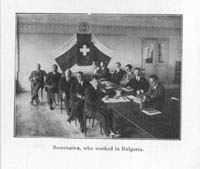 During the course of the war, Sartorius assembled a staff of six World's Alliance secretaries. With the exception
of Keller, most were recruited from Switzerland. These Red Triangle workers included Fritz von Steiger, Emil Lutz,
J. G. Fritschi, Konrad Meyer, and Edouard Voellmy. Fritschi traveled between the prison camps in Schumen, Varna,
Dobritch, Eski-Djoumaja, and Rassgard, while Meyer worked with Bulgarian prisoners incarcerated in Salonika after
the war. Sartorius coordinated these secretaries' activities through a series of monthly POW work conferences held
in Sofia beginning in January 1918. To review their work, most of these secretaries, and Gotthard Dumeruth, participated
in a conference in Regensburg, Switzerland in July 1919, and drew up a list of recommendations for Association POW
work in the future.14
During the course of the war, Sartorius assembled a staff of six World's Alliance secretaries. With the exception
of Keller, most were recruited from Switzerland. These Red Triangle workers included Fritz von Steiger, Emil Lutz,
J. G. Fritschi, Konrad Meyer, and Edouard Voellmy. Fritschi traveled between the prison camps in Schumen, Varna,
Dobritch, Eski-Djoumaja, and Rassgard, while Meyer worked with Bulgarian prisoners incarcerated in Salonika after
the war. Sartorius coordinated these secretaries' activities through a series of monthly POW work conferences held
in Sofia beginning in January 1918. To review their work, most of these secretaries, and Gotthard Dumeruth, participated
in a conference in Regensburg, Switzerland in July 1919, and drew up a list of recommendations for Association POW
work in the future.14
18
In spite of the terrible conditions found in Bulgaria during the First World War, the YMCA was able to establish an effective War Prisoners' Aid program in the kingdom. The International Committee in New York and the World's Alliance in Geneva cooperated to provide the funding needed to construct or modify Association halls in most Bulgarian prison camps and the manpower to implement programming and services. The Red Triangle's success in Bulgaria can be attributed to three important factors. First, by the time Bulgaria entered the war in October 1915, the Association had gained considerable experience in establishing and extending WPA services to prisoners of war. As a result, the YMCA had a successful welfare program that could easily be adapted to the kingdom's situation. Second, the POW problem in Bulgaria was not as acute as in other belligerent nations in terms of the number of prisoners that needed to be served. While the Bulgarians had incarcerated a considerable number of Serbian and Romanian POWs, these numbers did not reach the millions of prisoners held in Germany or in Austria-Hungary. As a result, a small number of Association secretaries could address the needs of a far larger percentage of war prisoners. Finally, the situation in Bulgaria was so bad that the government was eager to allow foreign relief services to Allied prisoners. Bulgaria had suffered through two wars within three years before the government joined the Central Powers in 1915, and the country simply lacked the resources to provide support for a new group of prisoners. The Association's offer to provide relief services to Allied POWs helped the Bulgarian government meet its international legal obligations and, due to the Principle of Reciprocity, benefited Bulgarian prisoners held by the Allies.
Notes:
Note 1: Kenneth Scott Latourette, World Service: A History of the Foreign Work and World Service of the Young Men's Christian Associations of the United States and Canada (New York: Association Press, 1957), 388. back
Note 2: The United States continued to look after British interests in Bulgaria after England and Bulgaria went to war. The Dutch accepted responsibility for looking after the interests of Belgium, France, Greece, Italy, Montenegro, Portugal, Russia, and Serbia. Murphy wrote a letter of commendation for the YMCA secretaries for their POW work after the war as part of their departing visas from Bulgaria. "Interned in Bulgaria," Living Age 30 (18 January 1919): 146-48; and Melvell von Carnbee, "Testimonial," No. 5186, 19 March 1918, Sofia, 1. D. A. Murphy, U.S. Legation, 13 November 1918, Sofia, 1. Box X391.2: "War Prisoners' Aid Y.M.C.A., 1914-1920: P.O.W. Camps in: Russia and Siberia; Greece; Serbia; Bulgaria." File: "Certificates and Laissez-Passer for Y.M.C.A. Secretaries Working in P.O.W. Camps in Bulgaria." World's Alliance of YMCAs Archives, Geneva. back
Note 3: "Greek Protests Against Bulgar Brutality," Current History Magazine 9:2 (January 1919): 88; and "Interned in Bulgaria," 148-49. back
Note 4: "Interned in Bulgaria," 148-49; and "Greek Protests Against Bulgar Brutality," 88. back
Note 5: "Greek Protests Against Bulgar Brutality," 88. back
Note 6: D. N. Furnajieff, "Bulgaria," For the Millions of Men Now Under Arms 1 (15 April 1916): 46-47. back
Note 7: Christian Phildius, "A Letter from the Organizing Secretary," For the Millions of Men Now Under Arms 2 (1 February 1917): 50; "Bulgaria," For the Millions of Men Now Under Arms 2 (1 February 1917): 49-50; and "Bulgaria," For the Millions of Men Now Under Arms 2 (1 June 1917): 51. back
Note 8: Christian Phildius, "A Letter from the Organizing Secretary," For the Millions of Men Now Under Arms 2 (1 February 1917): 50-51. back
Note 9: "Bulgaria," For the Millions of Men Now Under Arms 2 (1 February 1917): 50; "Bulgaria," For the Millions of Men Now Under Arms 2 (1 June 1917): 51; Harvey G. Smith, "Bulgaria (General Background Report)," circa 1924, 1. International Division Box 228: "Bulgaria: Reports and Correspondence, 1923-1946; Sofia, 1922-1953; School for Russian Refugees, Sofia, 1922-1924; Printed Material (Processed), Bu-1." File: "Bulgaria: Sofia: Vocational School, 1922-1924." YMCAs of the U.S. Archives, Minneapolis, MN; J. E. Guechoff, "Certificat," 19 March 1918, Sofia, 1. Jonkheer Melvell von Carnbee, "Certificat," 19 March 1918, Sofia, 1. D. A. Murphy, "Certificat," 25 March 1918, Sofia, 1. Melvell von Carnbee, "Legation Royale des Pays-Bas," No. 20046, circa March 1918, 1. Box X391.2: "War Prisoners' Aid Y.M.C.A., 1914-1920: P.O.W. Camps in: Russia and Siberia; Greece; Serbia; Bulgaria." File: "Certificates and Laissez-Passer for Y.M.C.A. Secretaries Working in P.O.W. Camps in Bulgaria." World's Alliance of YMCAs Archives, Geneva; Ernst Sartorius to Viktor Schleppi, 11 June 1917, Sofia, 1-2. Box X391.2: "War Prisoners' Aid Y.M.C.A., 1914-1920: P.O.W. Camps in: Russia and Siberia; Greece; Serbia; Bulgaria." File: "Copies of Letters Written by E. Sartorius Regarding War Prisoners' Aid in Bulgaria, 1917-1918." World's Alliance of YMCA's Archives, Geneva; "American Secretaries of Prisoner of War Aid and Other Work of the Young Men's Christian Associations," 16 March 1917, 1. Box X391: "War Work Y.M.C.A., 1914-1918: World's Committee, Geneva." Folder: "War Prisoners' Aid Y.M.C.A.-Lists of Secretaries/Instructions for Secretaries, 1914-1918." World's Alliance of YMCAs Archives, Geneva; William Howard Taft, Frederick Harris, Frederic Houston Kent, and William J. Newlin, eds., Service with Fighting Men: An Account of the Work of the American Young Men's Christian Association in the World War, 2 vols. (New York: Association Press, 1922), 2:288; and Latourette, World Service, 388. back
Note 10: Harvey G. Smith, "Bulgaria (General Background Report)," circa 1924, 1. International Division Box 228: "Bulgaria: Reports and Correspondence, 1923-1946; Sofia, 1922-1953; School for Russian Refugees, Sofia, 1922-1924; Printed Material (Processed), Bu-1." File: "Bulgaria: Sofia: Vocational School, 1922-1924." YMCAs of the U.S. Archives, Minneapolis, MN; Christian Phildius, "A Letter from the Organizing Secretary," For the Millions of Men Now Under Arms 2 (1 February 1917): 52; and Taft, Harris, Kent, and Newlin, Service with Fighting Men, 2:287. back
Note 11: Christian Phildius to General Bradestiloff, December 1917, Sofia, 1-3. Lt. General Bradestiloff, Order No. 7477, 21 December 1917, Sofia, 1. Box X391.2: "War Prisoners' Aid Y.M.C.A., 1914-1920: P.O.W. Camps in: Russia and Siberia; Greece; Serbia; Bulgaria." File: "Copies of Letters Written by E. Sartorius Regarding War Prisoners' Aid in Bulgaria, 1917-1918." World's Alliance of YMCAs Archives, Geneva; Christian Phildius to John R. Mott, 2 November 1917, Geneva, 3. Christian Phildius to Paul Des Gouttes, 10 December 1917, Sofia, 1-3. Box X391: "War Work Y.M.C.A., 1914-1918: World's Committee, Geneva." Folder: "War Work of World's Committee-Reports of Christian Phildius." World's Alliance of YMCAs Archives, Geneva; and Taft, Harris, Kent, and Newlin, Service with Fighting Men, 2:288. back
Note 12: Bulgarian Ministry of War, Prisoner of War Bureau to Christian Phildius, Order No. 7477, 21 December 1917, m Sofia, 1. Bulgarian Ministry of War, Prisoners of War Bureau to Division Chiefs, Order No. 7479, 21 December 1917, Sofia, 1. World's Alliance of YMCAs, Bulgarian Branch, War Prisoners' Aid, circa December 1917, 1. Box X391.2: "War Prisoners' Aid Y.M.C.A., 1914-1920: P.O.W. Camps in: Russia and Siberia; Greece; Serbia; Bulgaria." File: "Copies of Letters Written by E. Sartorius Regarding War Prisoners' Aid in Bulgaria, 1917-1918." World's Alliance of YMCAs Archives, Geneva. back
Note 13: Jack Keller, "First Report on Prisoner of War Camp at Philippopolis," 1 June 1917, Philippopolis, Bulgaria, 1?2. Jack Keller, "Second Rapport sur le Camp de Prisonniers de Guerre de Philippopolis du 31 Mai au 30 Juin 1917," 1 August 1917, Philippopolis, Bulgaria, 1-4. Jack Keller, "The World's Committee Y.M.C.A. Branch at Philippopolis, Bulgaria: Report on Concerts, Football Matches, etc. Month Ending 31st December 1917," circa December 1917, 1-2. Jack Keller, "The World's Committee Y.M.C.A. Branch at Philippopolis, Bulgaria: Month Ending 31st January 1918. Report on Concerts, Football, etc," circa February 1918, 1-4. Jack Keller, "Philippopolis, Bulgaria, May 8th, 1918," 1; Box X391.2: "War Prisoners' Aid YMCA, 1914-1920, POW Camps in Russia and Siberia, Greece, Serbia, and Bulgaria. Section (497.2) Bulgaria. Folder: "WPA Reports of Various Secretaries Working in Bulgaria"; "Interned in Bulgaria," 148; and Taft, Harris, Kent, and Newlin, Service with Fighting Men, 2:288. back
Note 14: Fritz von Steiger, "Bericht über seine Arbeit in der Kriegsgefangenenhilfe in Bulgarien während der Zeit von der Konferenz in Warna, 24. September bis 6. Dezember 1918 (Die Reise dauerte bis 21. Januar 1919, Tag der Ankunft in der Schweiz)," circa January 1919, 1-3; Emil Lutz, "Schlussbericht des Y.M.C.A. Sekretärs Emil Lutz in Bulgarien," 30 January 1919, Rheieck, Switzerland, 1-3; J. G. Fritschi, "Rückblick von J. G. Fritschi, gez. Sekretär der Kriegsgefangenenhilfe Christlicher Vereine jünger Männer in Bulgarien in Varna," no date, 1-3; J. G. Fritschi, "Bericht über die Reise nach Schumen, Varna, Dobritch, Eski-Djoumaja, Rassgard zur Einführung von Herrn J. G. Fritschi, Sekretär der Kriegsgefangenenhilfe Christlicher Vereine jünger Männer," 14 March 1918, Sofia, 1-4; J. G. Fritschi, "Sonntag, 12 Mai 1918, Ein "Feiertag: eines Kriegsgefangenen-Sekretär in Bulgarien," circa May 1918, 1-2; Konrad Meyer, "Arbeits von Sekretär Konrad Meyer. Im September 1918," circa October 1918, 1-10; Konrad Meyer, "Bericht von Konrad Meier, Sekretär der Kriegsgefangenenhilfe des Weltbundes Christlicher Vereine jünger Männer über die Heimreise und des Besuch der bulgarische Gefangenen in Saloniki," no date, 1-5; "Erlebnisse bei der Arbeit als Sekretär der Kriegsgefangenenhilfe des Weltbundes Christlicher Vereine jünger Männer in Bulgarien," no date, 1-14. Box X391.2: "War Prisoners' Aid Y.M.C.A., 1914-1920: P.O.W. Camps in: Russia and Siberia; Greece; Serbia; Bulgaria." File: "War Prisoners' Aid Reports of Various Y.M.C.A. Secretaries Working in Bulgaria." World's Alliance of YMCAs Archives, Geneva, Switzerland; Ernst Sartorius and Jack Keller, "Protokoll der Sekretär-Konferenz vom 30 Januar 1918," 30 January 1918, Sofia, 1-2; Jack Keller and J. G. Fritschi, "Protokoll der Sekretär-Konferenz vom 19. Februar," 19 February 1918, Sofia, 1-2; Edouard Voellay and Konrad Meyer, "Protokoll der Sekretär-Konferenz vom 18. März 1918," 18 March 1918, Sofia, 1-2; J. G. Fritschi and Jack Keller, "Protokoll der IV. Sekretär-Konferenz der Kriegsgefangenenhilfe in Bulgarien vom 16 April 1918," 16 April 1918; Ernst Satorius, "Bericht über die Konferenz ehemaliger Sekretär der Kriegsgefangenenhilfe Christlicher Vereine jünger Männer in Bulgarien in Regensburg, Ktn. Zürich, 19.-23. Juli 1919," circa July 1919, 1-3; Ernst Satorius, Jack Keller, Edouard Voellay, J.G. Fritschi, Konrad Meyer, Gotthard Dumermuth, and Emil Lutz, "Propositions," Regensburg, Ktn. Zürich, Switzerland, 23 July 1919, 1; Ernst Satorius, "Remarques ajoutees aux propositions de la Conference de Regensburg," 20 August 1919, Geneva, 1. Box X391.2: "War Prisoners' Aid Y.M.C.A., 1914-1920: P.O.W. Camps in: Russia and Siberia; Greece; Serbia; Bulgaria." File: "Conferences of Y.M.C.A. Secretaries Working in P.O.W. Camps in Bulgaria, 1918-1919." World's Alliance of YMCAs Archives, Geneva; and Ernst Sartorius, "Bericht über die Tätigkeit der Kriegsgefangenenhilfe Christlicher Vereine jünger Männer in Bulgarien. (April 1917-Februar 1918)," 18 February 1918, Sofia, 1-16; Ernst Satorius, "Memorandum über die Kriegsgefangenenhilfe Christlicher Vereine jünger Männer in Bulgarien," 8 April 1918, Bern, 1-3. Box X391.2: "War Prisoners' Aid Y.M.C.A., 1914-1920: P.O.W. Camps in: Russia and Siberia; Greece; Serbia; Bulgaria." File: "Ernst Sartorius-War Prisoners' Aid Reports from Bulgaria." World's Alliance of YMCAs Archives, Geneva. back